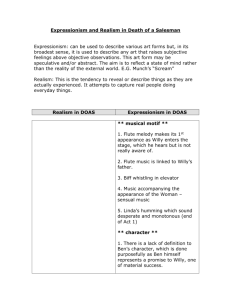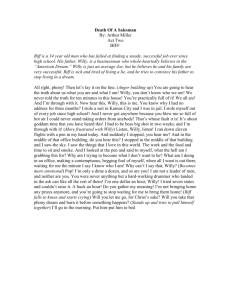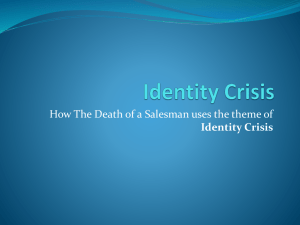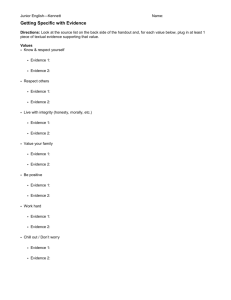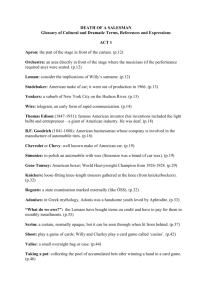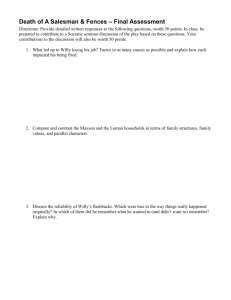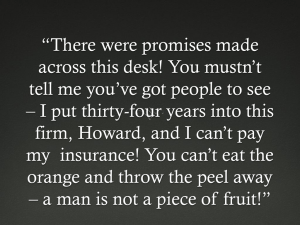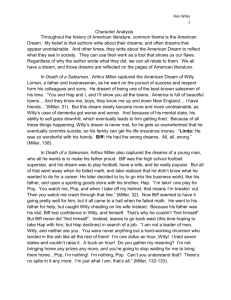`Death of a Salesman` By Arthur Miller
advertisement
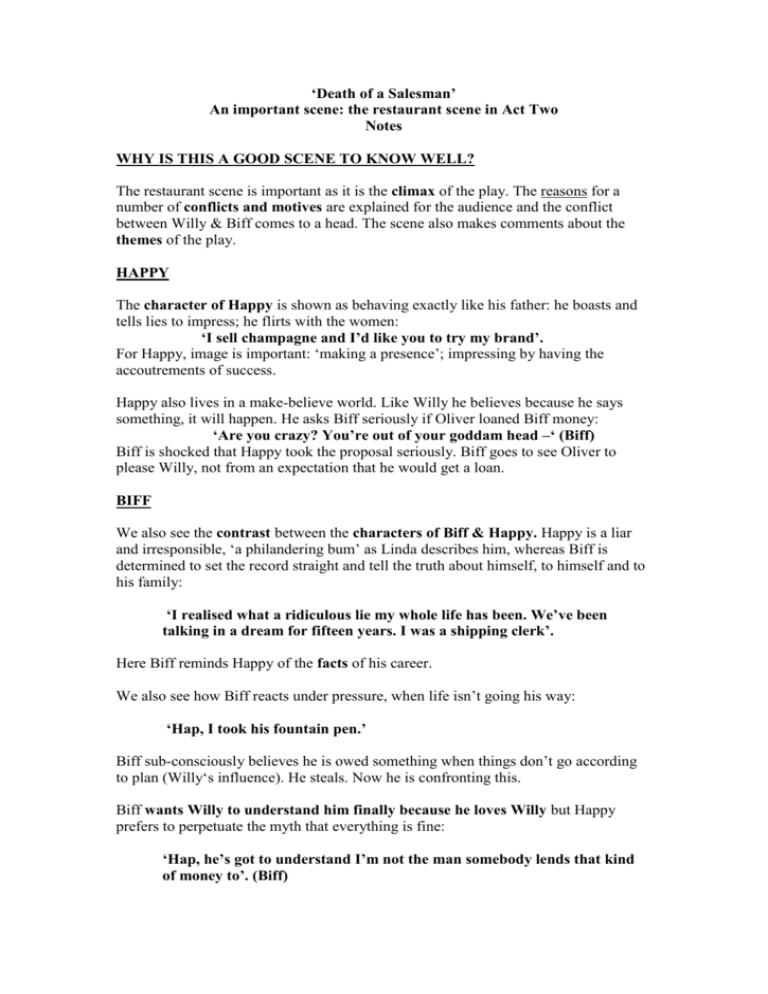
‘Death of a Salesman’ An important scene: the restaurant scene in Act Two Notes WHY IS THIS A GOOD SCENE TO KNOW WELL? The restaurant scene is important as it is the climax of the play. The reasons for a number of conflicts and motives are explained for the audience and the conflict between Willy & Biff comes to a head. The scene also makes comments about the themes of the play. HAPPY The character of Happy is shown as behaving exactly like his father: he boasts and tells lies to impress; he flirts with the women: ‘I sell champagne and I’d like you to try my brand’. For Happy, image is important: ‘making a presence’; impressing by having the accoutrements of success. Happy also lives in a make-believe world. Like Willy he believes because he says something, it will happen. He asks Biff seriously if Oliver loaned Biff money: ‘Are you crazy? You’re out of your goddam head –‘ (Biff) Biff is shocked that Happy took the proposal seriously. Biff goes to see Oliver to please Willy, not from an expectation that he would get a loan. BIFF We also see the contrast between the characters of Biff & Happy. Happy is a liar and irresponsible, ‘a philandering bum’ as Linda describes him, whereas Biff is determined to set the record straight and tell the truth about himself, to himself and to his family: ‘I realised what a ridiculous lie my whole life has been. We’ve been talking in a dream for fifteen years. I was a shipping clerk’. Here Biff reminds Happy of the facts of his career. We also see how Biff reacts under pressure, when life isn’t going his way: ‘Hap, I took his fountain pen.’ Biff sub-consciously believes he is owed something when things don’t go according to plan (Willy‘s influence). He steals. Now he is confronting this. Biff wants Willy to understand him finally because he loves Willy but Happy prefers to perpetuate the myth that everything is fine: ‘Hap, he’s got to understand I’m not the man somebody lends that kind of money to’. (Biff) ‘ You tell him something nice’. (Happy) Biff knows he must set the record straight with Willy: ‘He thinks I’ve been spiting him all these years and it’s eating him up’. CONFLICT WITH WILLY Buoyed up by a couple of drinks Biff begins to tell Willy he did not see Oliver. Willy, having just been fired by Howard, does not want to hear more bad news: ‘I was fired and I’m looking for a little good news to tell your mother, because the woman has waited and the woman has suffered’. Willy emotionally blackmails Biff into painting an optimistic picture of the interview, as usual, because if Willy isn’t a success then Biff has to be to compensate. Biff reluctantly falls into the old pattern until frustration at Willy’s manipulation makes him break off: ‘I can’t talk to him’. Notice the stage direction of a ‘single trumpet note jars the air’. Trumpets traditionally signal the announcement of news and gains the audience’s attention. Biff is trying to break away from Willy’s lies and deceptions. Willy moves into a reverie of the time Biff ‘flunked math’. Willy equates the current situation of Biff going against Willy’s wishes as another ‘spite’ against him, like the time he refused to take the maths test again and accuses Biff: ‘You had to go and flunk math!’ This double conversation (like that of Willy, Charley & Ben in Act One) scares the boys as they see Willy’s mental fragility. We see the irony of Biff telling Willy the truth about the interview and Willy not listening. It is almost amusing but we feel pity for Biff. He rift between Biff and Willy is at its height. Willy on realising Biff stole Oliver’s pen fully enters the memory of Biff discovering him in the hotel room in Boston with the Woman. For the audience this clarifies the conflict that exists between Biff and Willy at the start of Act One and why Biff told Linda Willy was a ‘fake’. As Willy’s confusion between present and past intensifies the girls join the table and Biff acknowledges Willy with: ‘just seen a prince walk by’ in contrast to Happy’s wish to ignore Willy’s embarrassing behaviour. Biff tells Happy to help him: ‘You could help him – I can’t --- he’s going to kill himself’. Biff knows his relationship with his father is fraught with misunderstandings and asks Happy to take some responsibility for his father, if only for Biff’s sake: ‘ Hap, help him! Help me, I can’t bear to look at his face!’ The emotion is intense at this point for Biff as he runs out of the restaurant weeping. He has tried to face up to the truth with Willy but failed. This will not be resolved until the next scene. Happy tries to return the situation to normal, not understanding the significance of what he has witnessed and denies knowing his father: ‘ No, that’s not my father. He’s just a guy.’ All earlier disgust at Happy’s attitudes intensifies. There is a Biblical allusion to Peter denying Christ Happy and the girls leave the restaurant. Meanwhile Willy is in the restaurant washroom reliving the time Biff found him with the Woman. The whole of the plot has lead to this moment. Willy tries to find excuses for the Woman’s presence in his hotel room. Biff says nothing as the truth of the situation dawns on him. Deflated, he answers the Woman’s question automatically as she leaves with Linda’s stockings. When Willy promises to see Birmbaum in the morning he replies: ‘Never mind’. Biff breaks down in tears as his illusions of his father dissolve until he shouts accusingly: ‘ You phoney little fake!’ The stage directions state ‘overcome he turns quickly and weeping fully goes out’. Here we see how devastated Biff is by the realisation that all his father has told him previously is a lie and he reacts by rejecting Willy. Their relationship has never recovered from that moment. Finally Willy returns to reality, helped by the waiter, not his sons who have deserted him, and he asks if his appearance is respectable: ‘Do I – I look all right?’ Even in moments of extreme crisis Willy is concerned about image. He then states he has no need for money any more and the audience wonder if he is about to commit suicide. He then hurries off to buy some seeds, a symbol of investment in the future. The audience, exhausted by the emotion of this scene, is left wondering what Willy is now planning.

